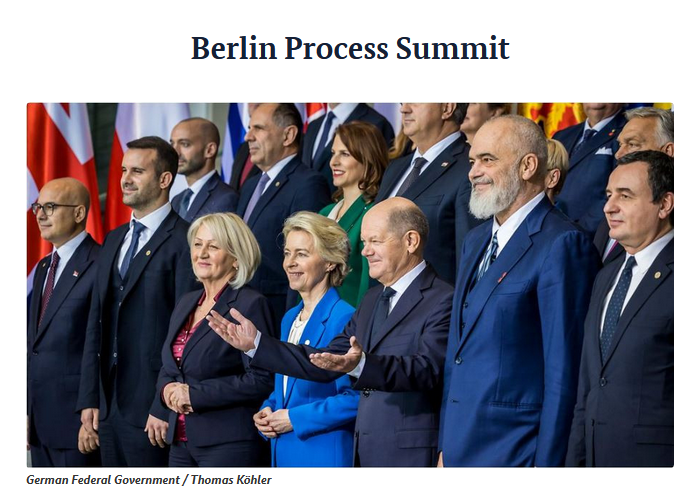In the 10th anniversary of the launching of the Berlin Process in 2014, the Heads of Government of Albania, Bosnia and Herzegovina, Kosovo, Montenegro, North Macedonia, Serbia, as well as the representatives of Austria, Bulgaria, Croatia, France, Germany, Greece, Italy, Poland, Slovenia, the United Kingdom, and representatives of the European Union (EU) and of international and regional bodies and organisations as well as financial institutions met in person in Berlin on 14 October 2024 for the Summit Meeting of the Berlin Process. Hungary in its capacity as rotating Presidency of the Council of the European Union was invited as an observer.
Among the highlights and conclusions of the chairs, several topics were addressed, which also concern the core areas of the Western Balkans Info Hub (in particular research and innovation and higher education). For all conclusions please refer to the source of this selection here.
Common Regional Market and Regional Investments – the conclusions refer to the mutual recognition of higher education and professional qualifications within the region and the signing of the Agreement on Access to Higher Education and Admission to Study in the Western Balkans. This new mobility agreement aims to increase student mobility and grant them the right to study at accredited higher education institutions in the region. Together with the mobility agreements signed at the Berlin Process Summits in 2022 and 2023, this agreement will further increase opportunities for free movement in the Western Balkans. The participants underlined the need for full implementation and entry into force of all previously signed mobility agreements. 7. The participants highlighted that the new EU Growth Plan for the Western Balkans is a critical tool in fostering enlargement and accelerating reforms. With the leading role of the European Commission in that respect, it provides an extra set of incentives to governments in the Western Balkans to carry out fundamental reforms, including economic and institutional reforms as well as in rule of law, democracy and human rights, needed to integrate into the single market. Furthermore, the participants welcomed the OECD’s vital support to the Western Balkans through evidence-based policy analysis and advice aimed at enhancing competitiveness and fostering inclusive and sustainable economic growth.
On the topics of Youth, Science and Education the following points were noted (quoted from the document)
17. The Western Balkans Six participants reaffirmed their commitment in a Declaration on Science and Innovation on Infrastructure Access and Cooperation to promote research and innovation partnerships and foster a dynamic regional innovation ecosystem.
18. Participants welcomed the continuation of the Berlin Process Joint Science Conferences, co-ordinated by the German National Academy of Sciences Leopoldina, and the collective efforts over the past decade to advance the EU integration of the Western Balkans’ education, research, and innovation sectors. They acknowledged the need to accelerate this integration through increased domestic investments and dedicated EU funding facilities rooted in principles of solidarity and excellence. Participants recognised the importance of safeguarding public spaces for intellectual discourse to uphold European ideals and foster positive narratives in the region.
19. The participants expressed their strong support for the outcomes of the Western Balkans Youth Forum, organised by the Regional Youth Cooperation Office (RYCO), held on 13-14 October 2024, in Berlin, which emphasised the vital role of youth as agents of change. The participants called for their meaningful participation in decision-making processes and urged for the enhancement of reconciliation initiatives and youth mobility schemes, advancement of the regional Youth Peace and Security agenda, improved youth employability, and greater cooperation among relevant authorities to strengthen policies that address the needs and aspirations of young people and the additional emphasis it places on transport connectivity between the capitals of the participating countries.
Other topics included:
- Democracy and Strong Institutions
- Bilateral Issues and Good Neighbourly Relations
- Connectivity and Transport
- Energy, Climate policy and Green Agenda for the Western Balkans
- Food and Agriculture
- Social policy, Inclusion, Gender and Equality
- Migration
- Security
For more information please refer to https://www.berlinprocess.de/

